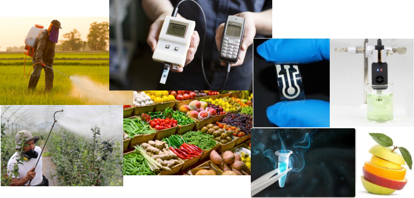 |
|
|
|
 |
The major scope of this project is to develop and validate a laboratory technology for the detection of pesticides
(glyphosate, cymoxanil) in fruits and vegetables samples using a friendly set-up coupled with a smartphone. The project proposes a revolutionary, fast and ecological method of obtaining graphene with the electric field created by plasma. In order to achieve this, we will design, implement and test a demonstrative model zeolites/graphene-Co nanoparticles modified electrode, for the sensitive and rapid glyphosate/ cymoxanil detection which is essential for the protection of environment and human health. |
Hence, graphene decorated with cobalt nanoparticles (CoNPs) will be mixed with a newly synthesized zeolite and employed as sensing element in an electrochemical cell, for the detection of glyphosate, cymoxanil. The selectivity of the proposed sensor is achieved by the presence of CoNPs which represents an excellent electrochemical mediator that allows the determination of organophosphorus pollutants. In addition, the porous morphology of the zeolite (pore size 4-10 Å) favored the insertion of the pesticide molecules by physical adsoption, enhancing the transfer of electrons at the solution/electrode interface. Other important achievements of the project will be: (i) cost-efficient and reproducible zeolite/graphene-CoNPs synthesis; (ii) full characterization of zeolite/graphene-CoNPs properties, as sensing layer on screen-printed stone paper electrode; (iii) studies of detection mechanisms and effect of modifications on surface electrode, analyte reactions and interactions. An important aim in this project will be to investigate the modification of zeolite/graphene surface with CoNPs. Such modification will enable to develop sensors on the new ecologicaly substrate stone paper to fabricate flexible screen-printed electrodes with low detection limits for pesticides relevant to environment, in laboratory conditions and in real sample (fruits and vegetables) using a friendly set-up coupled with a smartphone. In this way, we will use the knowledge generated by basic research in the sensor area, for developing a higher level of technological maturity. |
|
 |
|
Copyright (C) INCDTIM Cluj-Napoca.2022. All rights reserved. |
|